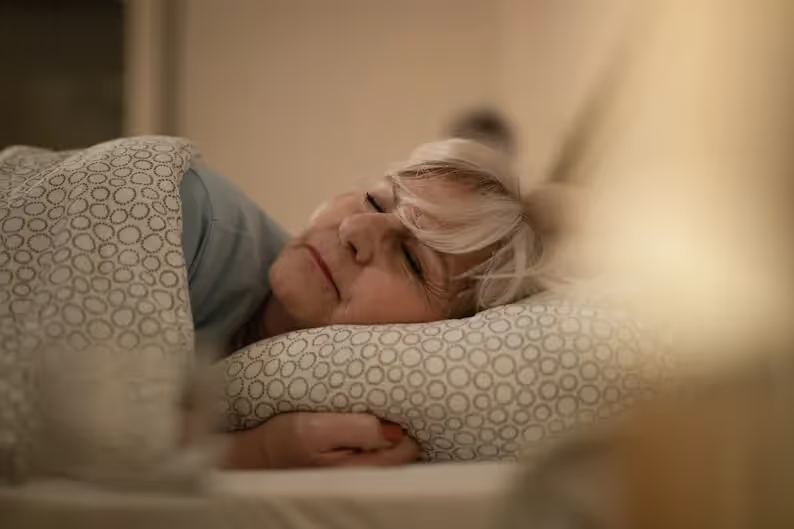As we age, it becomes increasingly common to experience disruptions in sleep. Many older adults find themselves waking up during the night, struggling to fall back asleep, or simply not feeling refreshed in the morning. The good news is that improving your sleep quality and staying asleep longer is possible with the right strategies. Read on for valuable tips for older adults to help enhance sleep hygiene and promote a good night's sleep.
Understanding Sleep and Aging
Sleep changes as we age, and these changes can interfere with sleep quality. The sleep cycle, which consists of various stages of light and deep sleep, may become shorter or more fragmented in older adults. This can lead to waking up during the night and difficulty staying asleep. One key factor to consider is the natural reduction in melatonin production, the hormone that regulates sleep. As melatonin levels decrease, it can become harder to maintain a consistent sleep cycle. Additionally, other health conditions, medications, and lifestyle factors can further disrupt sleep, making it challenging to stay asleep longer.
The Importance of Sleep Hygiene
Maintaining good sleep hygiene is essential for improving sleep quality. Sleep hygiene refers to the habits and practices that contribute to a good night's sleep. Here are some effective tips to help older adults stay asleep longer and wake up feeling refreshed:
- Establish Consistent Sleep Habits
One of the most important aspects of sleep hygiene is consistency. Going to bed and waking up at the same time every day, even on weekends, helps regulate your body's internal clock. This consistency reinforces your sleep cycle and makes it easier to fall asleep and stay asleep.
- Manage Light Exposure
Exposure to light plays a crucial role in regulating sleep. During the day, try to get plenty of natural light, especially in the morning. This helps reinforce your body's natural circadian rhythm. In the evening, dim the lights to signal to your body that it's time to wind down. Avoid using electronic devices like smartphones, tablets, and computers hours before bedtime, as the blue light emitted by these devices can interfere with sleep by suppressing melatonin production.
- Avoid Alcohol and Heavy Meals Before Bed
While alcohol might make you feel drowsy initially, it can actually interfere with sleep later in the night. Alcohol can disrupt the sleep cycle and lead to fragmented sleep, making it harder to stay asleep longer. Similarly, heavy or spicy meals consumed too close to bedtime can cause discomfort and indigestion, which may wake you up during the night. Aim to avoid alcohol and have your last meal at least 2-3 hours before bedtime.
- Incorporate Physical Activity into Your Routine
Regular physical activity has numerous benefits, including improved sleep quality. Exercise can help you fall asleep faster and stay asleep longer by reducing stress and anxiety. However, it's important to avoid exercising too close to bedtime, as this can have the opposite effect and make it harder to fall asleep. Aim to finish your workout at least 3 hours before bed to give your body time to wind down.
- Create a Relaxing Bedtime Routine
Establishing a calming bedtime routine can signal to your body that it's time to sleep. Activities such as reading a book, taking a warm bath, or practicing relaxation techniques like deep breathing or meditation can help ease your mind and prepare your body for sleep. A hot bath, in particular, can be effective in helping you fall asleep and stay asleep, as the subsequent drop in body temperature after the bath mimics the natural cooling of the body that occurs during sleep.
- Limit Naps During the Day
While napping can be beneficial, especially if you're not getting enough sleep at night, long or irregular naps can interfere with your sleep cycle. If you feel the need to nap, try to keep it short—no longer than 20 minutes—and avoid napping late in the afternoon.
Dealing with Sleep Disorders
For some older adults, difficulties with staying asleep longer may be linked to underlying sleep disorders. Here are a few common issues that can interfere with sleep:
- Sleep Apnea
Sleep apnea is a condition where breathing repeatedly stops and starts during sleep. It can cause frequent awakenings during the night and poor sleep quality. If you suspect you have sleep apnea, it's important to consult a healthcare provider for evaluation and treatment. Untreated sleep apnea not only interferes with sleep but can also lead to other health complications, such as high blood pressure and heart disease.
- Cognitive Behavioral Therapy for Insomnia (CBT-I)
Cognitive Behavioral Therapy for Insomnia (CBT-I) is a highly effective treatment for chronic insomnia. This therapy focuses on identifying and changing negative thoughts and behaviors that contribute to sleep problems. CBT-I can help you develop healthier sleep habits and reduce the anxiety that often accompanies insomnia, making it easier to stay asleep longer.
The Role of Sleep Aids
Sleep aids, whether prescription or over-the-counter, can be helpful for some individuals in managing short-term sleep difficulties. However, they should be used with caution and under the guidance of a healthcare provider. Over-reliance on sleep aids can lead to dependency and may not address the underlying causes of sleep problems. Natural supplements like melatonin can also be considered, but it's important to discuss their use with your doctor, especially if you're taking other medications.
Tips for Staying Asleep Longer
In addition to the strategies mentioned above, here are some additional tips that may help you stay asleep longer:
- Keep Your Bedroom Comfortable
Your sleep environment plays a significant role in your ability to stay asleep. Make sure your bedroom is cool, quiet, and dark. Consider using blackout curtains, earplugs, or a white noise machine to minimize disruptions. A comfortable mattress and pillows that support your preferred sleeping position can also make a difference.
- Manage Stress and Anxiety
Stress and anxiety are common culprits that can interfere with sleep. Practicing stress-reducing techniques like mindfulness, meditation, or gentle yoga can help calm your mind before bed. Writing down your worries in a journal before going to sleep can also help clear your mind and reduce nighttime awakenings.
- Use the 20-Minute Rule
If you wake up during the night and can't fall back asleep within 20 minutes, don't stay in bed tossing and turning. Instead, get up and do something relaxing in another room, such as reading or listening to soothing music, until you feel sleepy again. This prevents your brain from associating the bed with wakefulness and helps reinforce the connection between bed and sleep.
- Stay Hydrated, But Not Too Much
Dehydration can disrupt sleep, but drinking too much liquid before bed can lead to frequent trips to the bathroom during the night. Aim to stay hydrated throughout the day but reduce fluid intake in the evening to minimize nighttime awakenings.
Go to Sleep and Stay Asleep
Staying asleep longer is crucial for maintaining overall health and well-being, especially for older adults. By adopting good sleep habits and following these tips, you can improve your sleep quality and enjoy a restful night. Remember, consistency is key, and making small adjustments to your daily routine can have a significant impact on your ability to fall asleep and stay asleep. If sleep problems persist, consider consulting a healthcare provider to explore additional treatments, such as Cognitive Behavioral Therapy for Insomnia (CBT-I) or addressing conditions like sleep apnea. With the right approach, you can achieve the good night's sleep you deserve. Want to read more articles like this one? Subscribe to our Better News Blog and receive useful, healthful articles right in your inbox!




